International Political Economy: Globalization Analysis Essay
VerifiedAdded on 2021/05/27
|8
|1930
|49
Essay
AI Summary
This essay examines international political economy (IPE) through the lens of globalization, drawing on the works of Drezner, Rodrik, Irwin, and Frieden. It explores global governance, analyzing the roles of institutions like the IMF and WTO in managing economic crises and promoting free trade. The essay discusses Rodrik's arguments on the balance between democracy, globalization, and national self-determination, and Irwin's insights into free trade's advantages and disadvantages. Frieden's analysis of global capitalism and its historical patterns is also considered. The essay concludes by highlighting the diverse perspectives on globalization's impact, including its effects on employment, wages, and the successes and failures of international institutions. The essay emphasizes the complex relationship between globalization, political decisions, and economic outcomes, providing a comprehensive overview of IPE concepts and debates.
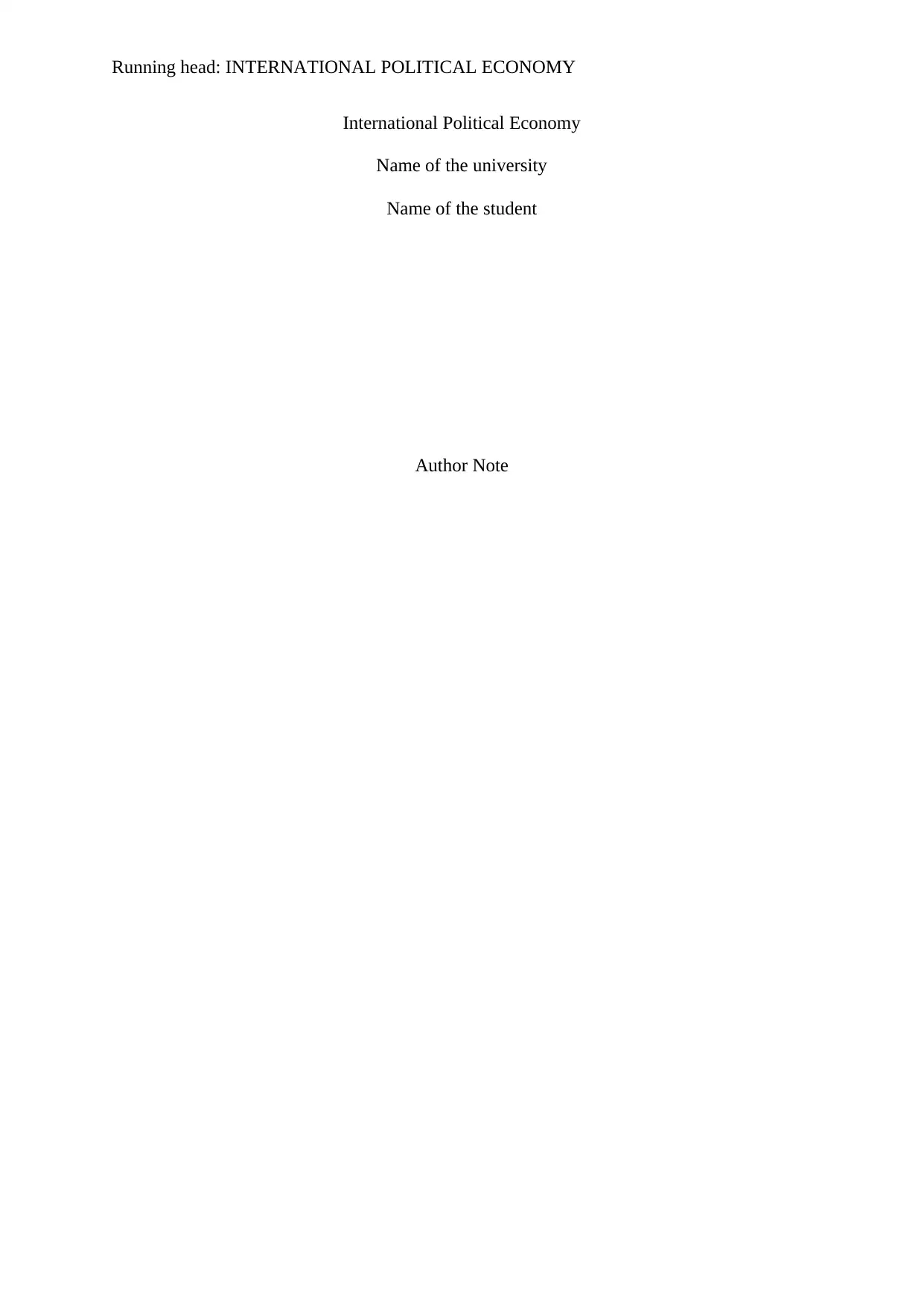
Running head: INTERNATIONAL POLITICAL ECONOMY
International Political Economy
Name of the university
Name of the student
Author Note
International Political Economy
Name of the university
Name of the student
Author Note
Paraphrase This Document
Need a fresh take? Get an instant paraphrase of this document with our AI Paraphraser
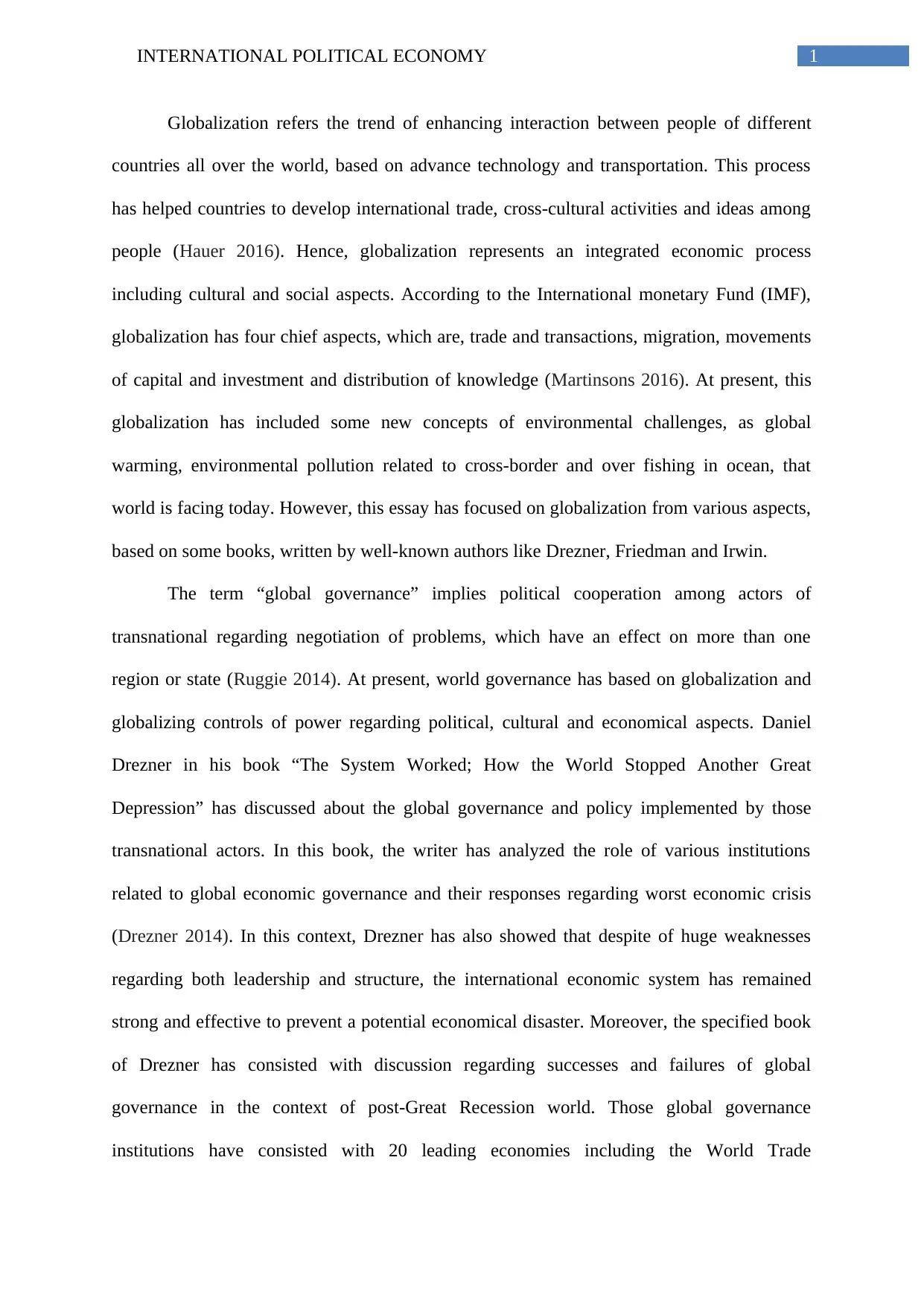
1INTERNATIONAL POLITICAL ECONOMY
Globalization refers the trend of enhancing interaction between people of different
countries all over the world, based on advance technology and transportation. This process
has helped countries to develop international trade, cross-cultural activities and ideas among
people (Hauer 2016). Hence, globalization represents an integrated economic process
including cultural and social aspects. According to the International monetary Fund (IMF),
globalization has four chief aspects, which are, trade and transactions, migration, movements
of capital and investment and distribution of knowledge (Martinsons 2016). At present, this
globalization has included some new concepts of environmental challenges, as global
warming, environmental pollution related to cross-border and over fishing in ocean, that
world is facing today. However, this essay has focused on globalization from various aspects,
based on some books, written by well-known authors like Drezner, Friedman and Irwin.
The term “global governance” implies political cooperation among actors of
transnational regarding negotiation of problems, which have an effect on more than one
region or state (Ruggie 2014). At present, world governance has based on globalization and
globalizing controls of power regarding political, cultural and economical aspects. Daniel
Drezner in his book “The System Worked; How the World Stopped Another Great
Depression” has discussed about the global governance and policy implemented by those
transnational actors. In this book, the writer has analyzed the role of various institutions
related to global economic governance and their responses regarding worst economic crisis
(Drezner 2014). In this context, Drezner has also showed that despite of huge weaknesses
regarding both leadership and structure, the international economic system has remained
strong and effective to prevent a potential economical disaster. Moreover, the specified book
of Drezner has consisted with discussion regarding successes and failures of global
governance in the context of post-Great Recession world. Those global governance
institutions have consisted with 20 leading economies including the World Trade
Globalization refers the trend of enhancing interaction between people of different
countries all over the world, based on advance technology and transportation. This process
has helped countries to develop international trade, cross-cultural activities and ideas among
people (Hauer 2016). Hence, globalization represents an integrated economic process
including cultural and social aspects. According to the International monetary Fund (IMF),
globalization has four chief aspects, which are, trade and transactions, migration, movements
of capital and investment and distribution of knowledge (Martinsons 2016). At present, this
globalization has included some new concepts of environmental challenges, as global
warming, environmental pollution related to cross-border and over fishing in ocean, that
world is facing today. However, this essay has focused on globalization from various aspects,
based on some books, written by well-known authors like Drezner, Friedman and Irwin.
The term “global governance” implies political cooperation among actors of
transnational regarding negotiation of problems, which have an effect on more than one
region or state (Ruggie 2014). At present, world governance has based on globalization and
globalizing controls of power regarding political, cultural and economical aspects. Daniel
Drezner in his book “The System Worked; How the World Stopped Another Great
Depression” has discussed about the global governance and policy implemented by those
transnational actors. In this book, the writer has analyzed the role of various institutions
related to global economic governance and their responses regarding worst economic crisis
(Drezner 2014). In this context, Drezner has also showed that despite of huge weaknesses
regarding both leadership and structure, the international economic system has remained
strong and effective to prevent a potential economical disaster. Moreover, the specified book
of Drezner has consisted with discussion regarding successes and failures of global
governance in the context of post-Great Recession world. Those global governance
institutions have consisted with 20 leading economies including the World Trade
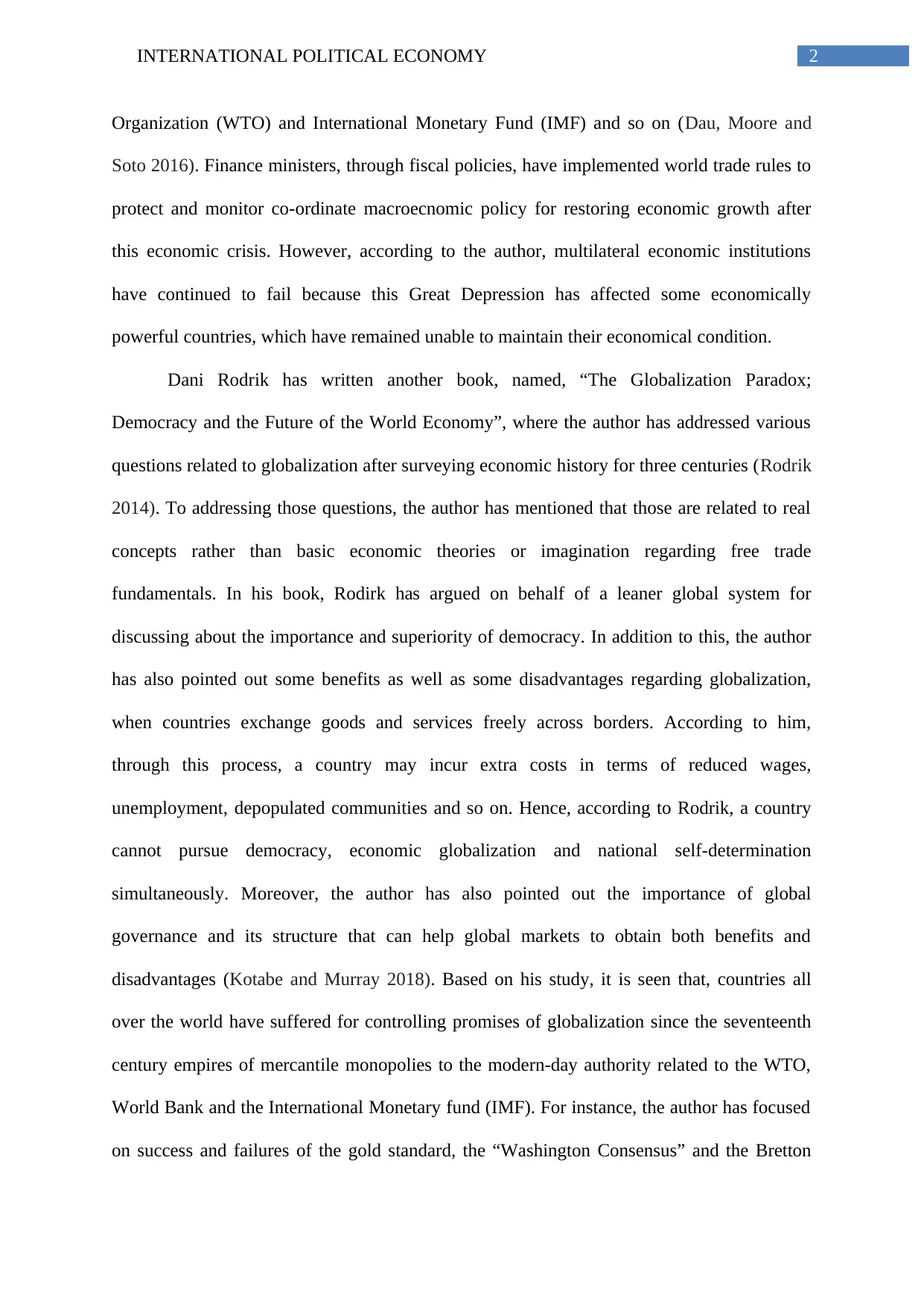
2INTERNATIONAL POLITICAL ECONOMY
Organization (WTO) and International Monetary Fund (IMF) and so on (Dau, Moore and
Soto 2016). Finance ministers, through fiscal policies, have implemented world trade rules to
protect and monitor co-ordinate macroecnomic policy for restoring economic growth after
this economic crisis. However, according to the author, multilateral economic institutions
have continued to fail because this Great Depression has affected some economically
powerful countries, which have remained unable to maintain their economical condition.
Dani Rodrik has written another book, named, “The Globalization Paradox;
Democracy and the Future of the World Economy”, where the author has addressed various
questions related to globalization after surveying economic history for three centuries (Rodrik
2014). To addressing those questions, the author has mentioned that those are related to real
concepts rather than basic economic theories or imagination regarding free trade
fundamentals. In his book, Rodirk has argued on behalf of a leaner global system for
discussing about the importance and superiority of democracy. In addition to this, the author
has also pointed out some benefits as well as some disadvantages regarding globalization,
when countries exchange goods and services freely across borders. According to him,
through this process, a country may incur extra costs in terms of reduced wages,
unemployment, depopulated communities and so on. Hence, according to Rodrik, a country
cannot pursue democracy, economic globalization and national self-determination
simultaneously. Moreover, the author has also pointed out the importance of global
governance and its structure that can help global markets to obtain both benefits and
disadvantages (Kotabe and Murray 2018). Based on his study, it is seen that, countries all
over the world have suffered for controlling promises of globalization since the seventeenth
century empires of mercantile monopolies to the modern-day authority related to the WTO,
World Bank and the International Monetary fund (IMF). For instance, the author has focused
on success and failures of the gold standard, the “Washington Consensus” and the Bretton
Organization (WTO) and International Monetary Fund (IMF) and so on (Dau, Moore and
Soto 2016). Finance ministers, through fiscal policies, have implemented world trade rules to
protect and monitor co-ordinate macroecnomic policy for restoring economic growth after
this economic crisis. However, according to the author, multilateral economic institutions
have continued to fail because this Great Depression has affected some economically
powerful countries, which have remained unable to maintain their economical condition.
Dani Rodrik has written another book, named, “The Globalization Paradox;
Democracy and the Future of the World Economy”, where the author has addressed various
questions related to globalization after surveying economic history for three centuries (Rodrik
2014). To addressing those questions, the author has mentioned that those are related to real
concepts rather than basic economic theories or imagination regarding free trade
fundamentals. In his book, Rodirk has argued on behalf of a leaner global system for
discussing about the importance and superiority of democracy. In addition to this, the author
has also pointed out some benefits as well as some disadvantages regarding globalization,
when countries exchange goods and services freely across borders. According to him,
through this process, a country may incur extra costs in terms of reduced wages,
unemployment, depopulated communities and so on. Hence, according to Rodrik, a country
cannot pursue democracy, economic globalization and national self-determination
simultaneously. Moreover, the author has also pointed out the importance of global
governance and its structure that can help global markets to obtain both benefits and
disadvantages (Kotabe and Murray 2018). Based on his study, it is seen that, countries all
over the world have suffered for controlling promises of globalization since the seventeenth
century empires of mercantile monopolies to the modern-day authority related to the WTO,
World Bank and the International Monetary fund (IMF). For instance, the author has focused
on success and failures of the gold standard, the “Washington Consensus” and the Bretton
⊘ This is a preview!⊘
Do you want full access?
Subscribe today to unlock all pages.

Trusted by 1+ million students worldwide
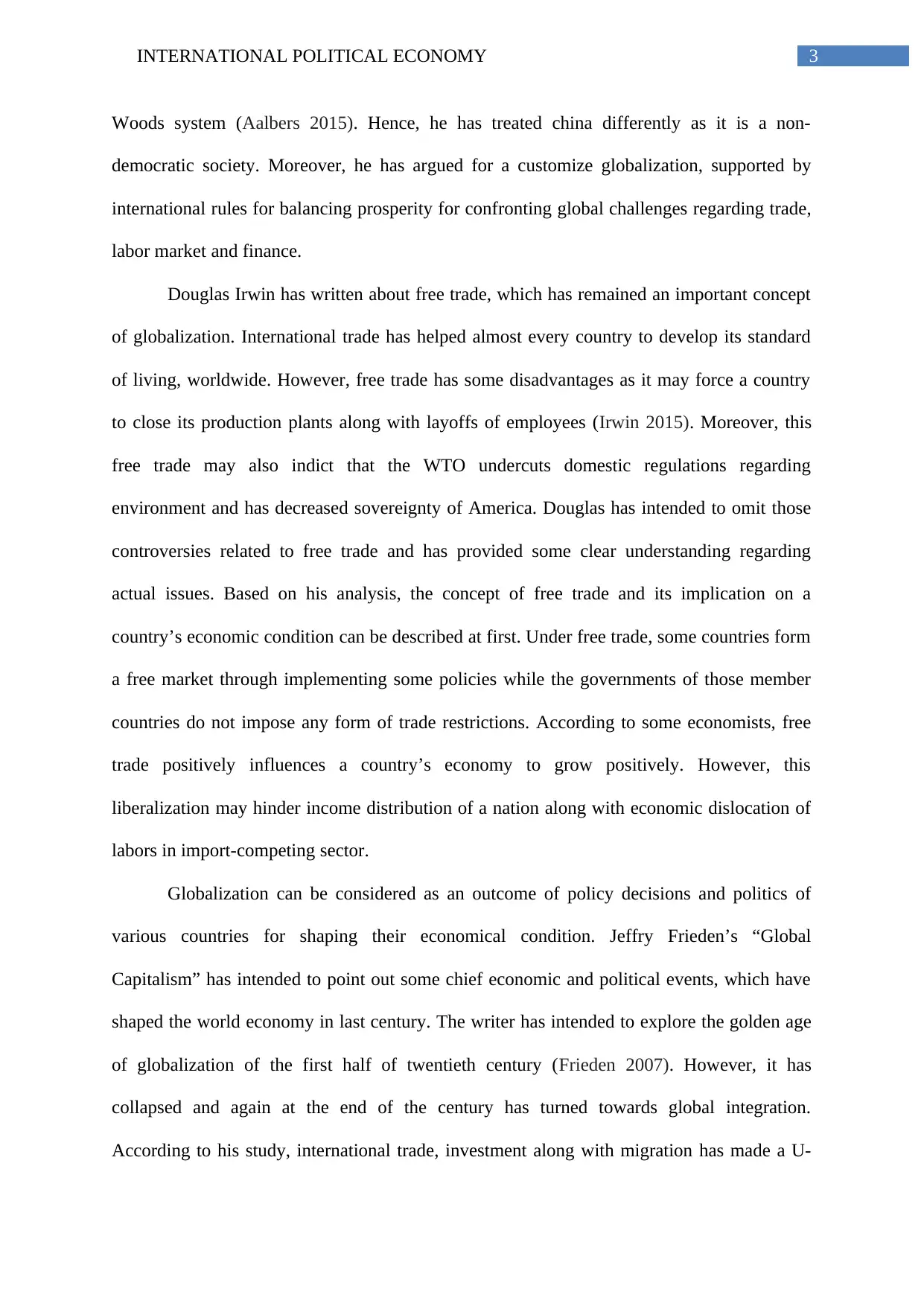
3INTERNATIONAL POLITICAL ECONOMY
Woods system (Aalbers 2015). Hence, he has treated china differently as it is a non-
democratic society. Moreover, he has argued for a customize globalization, supported by
international rules for balancing prosperity for confronting global challenges regarding trade,
labor market and finance.
Douglas Irwin has written about free trade, which has remained an important concept
of globalization. International trade has helped almost every country to develop its standard
of living, worldwide. However, free trade has some disadvantages as it may force a country
to close its production plants along with layoffs of employees (Irwin 2015). Moreover, this
free trade may also indict that the WTO undercuts domestic regulations regarding
environment and has decreased sovereignty of America. Douglas has intended to omit those
controversies related to free trade and has provided some clear understanding regarding
actual issues. Based on his analysis, the concept of free trade and its implication on a
country’s economic condition can be described at first. Under free trade, some countries form
a free market through implementing some policies while the governments of those member
countries do not impose any form of trade restrictions. According to some economists, free
trade positively influences a country’s economy to grow positively. However, this
liberalization may hinder income distribution of a nation along with economic dislocation of
labors in import-competing sector.
Globalization can be considered as an outcome of policy decisions and politics of
various countries for shaping their economical condition. Jeffry Frieden’s “Global
Capitalism” has intended to point out some chief economic and political events, which have
shaped the world economy in last century. The writer has intended to explore the golden age
of globalization of the first half of twentieth century (Frieden 2007). However, it has
collapsed and again at the end of the century has turned towards global integration.
According to his study, international trade, investment along with migration has made a U-
Woods system (Aalbers 2015). Hence, he has treated china differently as it is a non-
democratic society. Moreover, he has argued for a customize globalization, supported by
international rules for balancing prosperity for confronting global challenges regarding trade,
labor market and finance.
Douglas Irwin has written about free trade, which has remained an important concept
of globalization. International trade has helped almost every country to develop its standard
of living, worldwide. However, free trade has some disadvantages as it may force a country
to close its production plants along with layoffs of employees (Irwin 2015). Moreover, this
free trade may also indict that the WTO undercuts domestic regulations regarding
environment and has decreased sovereignty of America. Douglas has intended to omit those
controversies related to free trade and has provided some clear understanding regarding
actual issues. Based on his analysis, the concept of free trade and its implication on a
country’s economic condition can be described at first. Under free trade, some countries form
a free market through implementing some policies while the governments of those member
countries do not impose any form of trade restrictions. According to some economists, free
trade positively influences a country’s economy to grow positively. However, this
liberalization may hinder income distribution of a nation along with economic dislocation of
labors in import-competing sector.
Globalization can be considered as an outcome of policy decisions and politics of
various countries for shaping their economical condition. Jeffry Frieden’s “Global
Capitalism” has intended to point out some chief economic and political events, which have
shaped the world economy in last century. The writer has intended to explore the golden age
of globalization of the first half of twentieth century (Frieden 2007). However, it has
collapsed and again at the end of the century has turned towards global integration.
According to his study, international trade, investment along with migration has made a U-
Paraphrase This Document
Need a fresh take? Get an instant paraphrase of this document with our AI Paraphraser
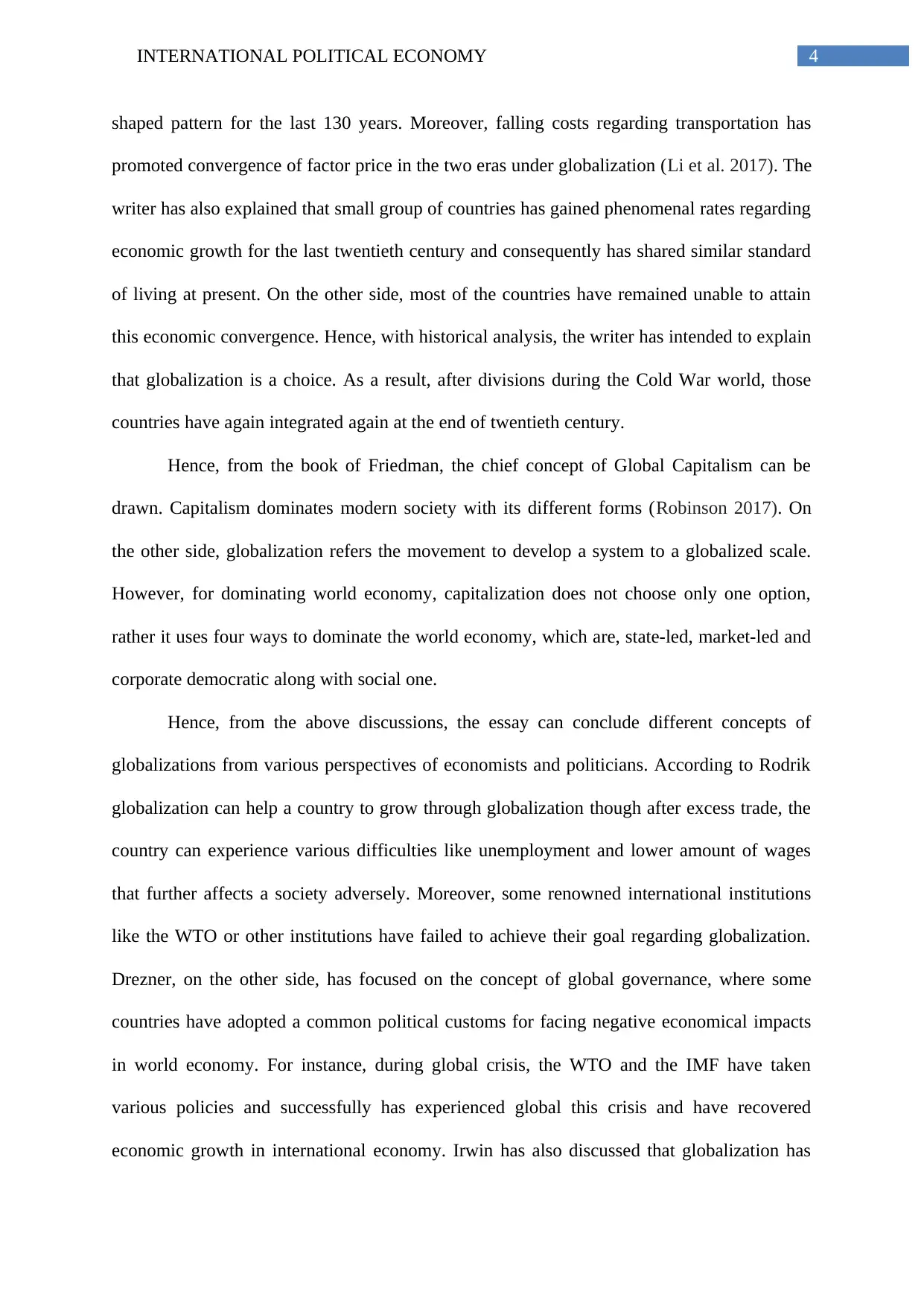
4INTERNATIONAL POLITICAL ECONOMY
shaped pattern for the last 130 years. Moreover, falling costs regarding transportation has
promoted convergence of factor price in the two eras under globalization (Li et al. 2017). The
writer has also explained that small group of countries has gained phenomenal rates regarding
economic growth for the last twentieth century and consequently has shared similar standard
of living at present. On the other side, most of the countries have remained unable to attain
this economic convergence. Hence, with historical analysis, the writer has intended to explain
that globalization is a choice. As a result, after divisions during the Cold War world, those
countries have again integrated again at the end of twentieth century.
Hence, from the book of Friedman, the chief concept of Global Capitalism can be
drawn. Capitalism dominates modern society with its different forms (Robinson 2017). On
the other side, globalization refers the movement to develop a system to a globalized scale.
However, for dominating world economy, capitalization does not choose only one option,
rather it uses four ways to dominate the world economy, which are, state-led, market-led and
corporate democratic along with social one.
Hence, from the above discussions, the essay can conclude different concepts of
globalizations from various perspectives of economists and politicians. According to Rodrik
globalization can help a country to grow through globalization though after excess trade, the
country can experience various difficulties like unemployment and lower amount of wages
that further affects a society adversely. Moreover, some renowned international institutions
like the WTO or other institutions have failed to achieve their goal regarding globalization.
Drezner, on the other side, has focused on the concept of global governance, where some
countries have adopted a common political customs for facing negative economical impacts
in world economy. For instance, during global crisis, the WTO and the IMF have taken
various policies and successfully has experienced global this crisis and have recovered
economic growth in international economy. Irwin has also discussed that globalization has
shaped pattern for the last 130 years. Moreover, falling costs regarding transportation has
promoted convergence of factor price in the two eras under globalization (Li et al. 2017). The
writer has also explained that small group of countries has gained phenomenal rates regarding
economic growth for the last twentieth century and consequently has shared similar standard
of living at present. On the other side, most of the countries have remained unable to attain
this economic convergence. Hence, with historical analysis, the writer has intended to explain
that globalization is a choice. As a result, after divisions during the Cold War world, those
countries have again integrated again at the end of twentieth century.
Hence, from the book of Friedman, the chief concept of Global Capitalism can be
drawn. Capitalism dominates modern society with its different forms (Robinson 2017). On
the other side, globalization refers the movement to develop a system to a globalized scale.
However, for dominating world economy, capitalization does not choose only one option,
rather it uses four ways to dominate the world economy, which are, state-led, market-led and
corporate democratic along with social one.
Hence, from the above discussions, the essay can conclude different concepts of
globalizations from various perspectives of economists and politicians. According to Rodrik
globalization can help a country to grow through globalization though after excess trade, the
country can experience various difficulties like unemployment and lower amount of wages
that further affects a society adversely. Moreover, some renowned international institutions
like the WTO or other institutions have failed to achieve their goal regarding globalization.
Drezner, on the other side, has focused on the concept of global governance, where some
countries have adopted a common political customs for facing negative economical impacts
in world economy. For instance, during global crisis, the WTO and the IMF have taken
various policies and successfully has experienced global this crisis and have recovered
economic growth in international economy. Irwin has also discussed that globalization has
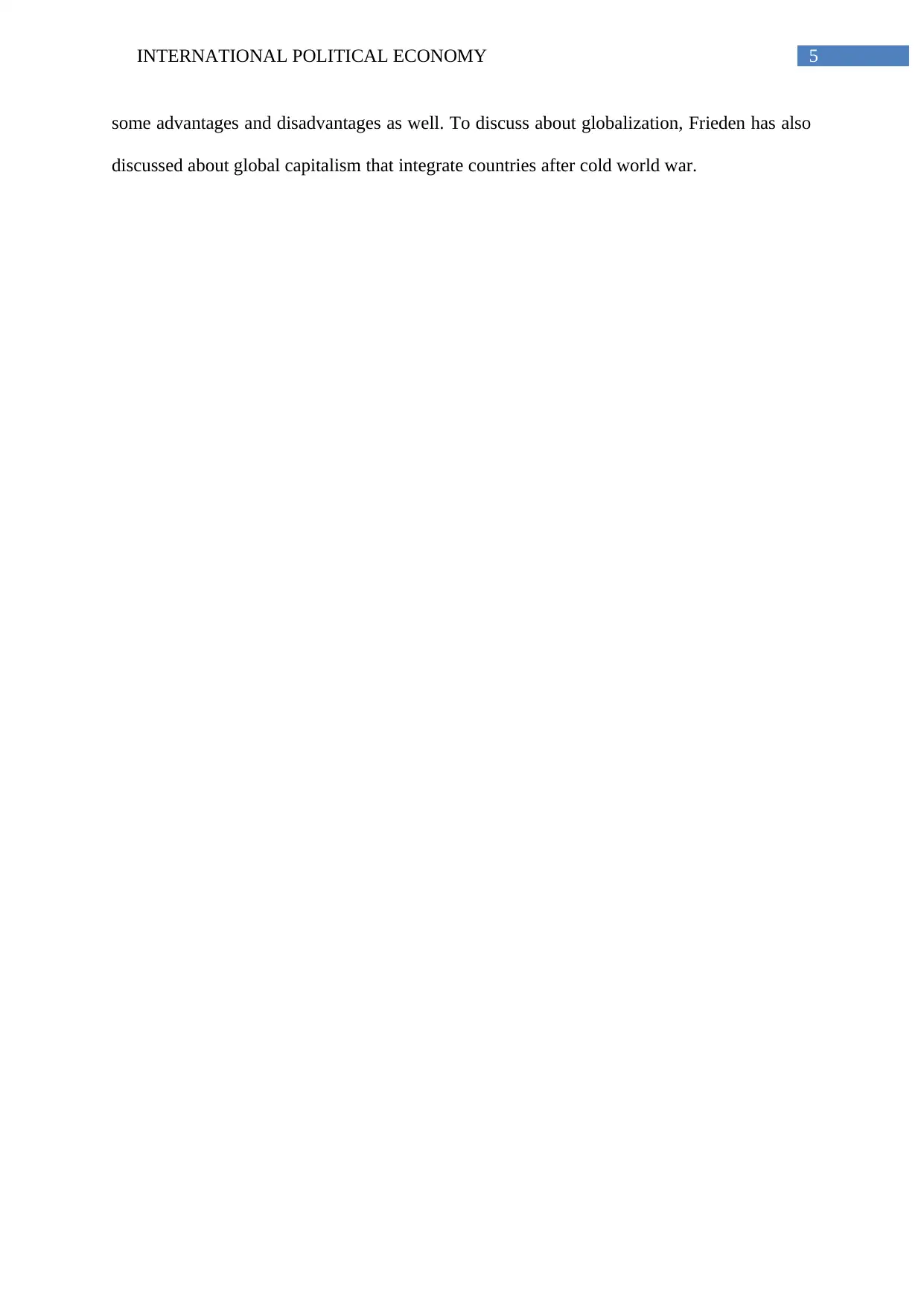
5INTERNATIONAL POLITICAL ECONOMY
some advantages and disadvantages as well. To discuss about globalization, Frieden has also
discussed about global capitalism that integrate countries after cold world war.
some advantages and disadvantages as well. To discuss about globalization, Frieden has also
discussed about global capitalism that integrate countries after cold world war.
⊘ This is a preview!⊘
Do you want full access?
Subscribe today to unlock all pages.

Trusted by 1+ million students worldwide
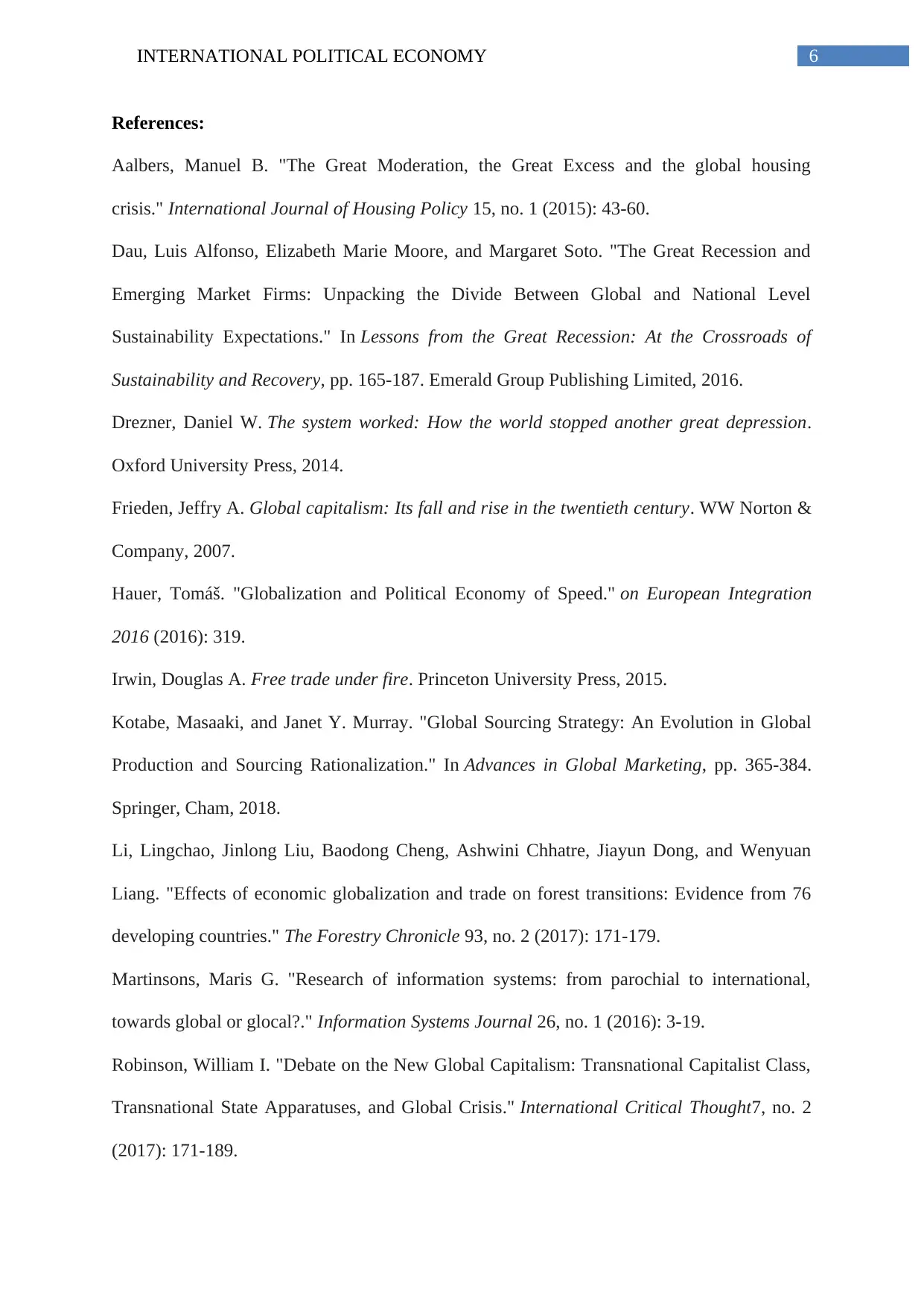
6INTERNATIONAL POLITICAL ECONOMY
References:
Aalbers, Manuel B. "The Great Moderation, the Great Excess and the global housing
crisis." International Journal of Housing Policy 15, no. 1 (2015): 43-60.
Dau, Luis Alfonso, Elizabeth Marie Moore, and Margaret Soto. "The Great Recession and
Emerging Market Firms: Unpacking the Divide Between Global and National Level
Sustainability Expectations." In Lessons from the Great Recession: At the Crossroads of
Sustainability and Recovery, pp. 165-187. Emerald Group Publishing Limited, 2016.
Drezner, Daniel W. The system worked: How the world stopped another great depression.
Oxford University Press, 2014.
Frieden, Jeffry A. Global capitalism: Its fall and rise in the twentieth century. WW Norton &
Company, 2007.
Hauer, Tomáš. "Globalization and Political Economy of Speed." on European Integration
2016 (2016): 319.
Irwin, Douglas A. Free trade under fire. Princeton University Press, 2015.
Kotabe, Masaaki, and Janet Y. Murray. "Global Sourcing Strategy: An Evolution in Global
Production and Sourcing Rationalization." In Advances in Global Marketing, pp. 365-384.
Springer, Cham, 2018.
Li, Lingchao, Jinlong Liu, Baodong Cheng, Ashwini Chhatre, Jiayun Dong, and Wenyuan
Liang. "Effects of economic globalization and trade on forest transitions: Evidence from 76
developing countries." The Forestry Chronicle 93, no. 2 (2017): 171-179.
Martinsons, Maris G. "Research of information systems: from parochial to international,
towards global or glocal?." Information Systems Journal 26, no. 1 (2016): 3-19.
Robinson, William I. "Debate on the New Global Capitalism: Transnational Capitalist Class,
Transnational State Apparatuses, and Global Crisis." International Critical Thought7, no. 2
(2017): 171-189.
References:
Aalbers, Manuel B. "The Great Moderation, the Great Excess and the global housing
crisis." International Journal of Housing Policy 15, no. 1 (2015): 43-60.
Dau, Luis Alfonso, Elizabeth Marie Moore, and Margaret Soto. "The Great Recession and
Emerging Market Firms: Unpacking the Divide Between Global and National Level
Sustainability Expectations." In Lessons from the Great Recession: At the Crossroads of
Sustainability and Recovery, pp. 165-187. Emerald Group Publishing Limited, 2016.
Drezner, Daniel W. The system worked: How the world stopped another great depression.
Oxford University Press, 2014.
Frieden, Jeffry A. Global capitalism: Its fall and rise in the twentieth century. WW Norton &
Company, 2007.
Hauer, Tomáš. "Globalization and Political Economy of Speed." on European Integration
2016 (2016): 319.
Irwin, Douglas A. Free trade under fire. Princeton University Press, 2015.
Kotabe, Masaaki, and Janet Y. Murray. "Global Sourcing Strategy: An Evolution in Global
Production and Sourcing Rationalization." In Advances in Global Marketing, pp. 365-384.
Springer, Cham, 2018.
Li, Lingchao, Jinlong Liu, Baodong Cheng, Ashwini Chhatre, Jiayun Dong, and Wenyuan
Liang. "Effects of economic globalization and trade on forest transitions: Evidence from 76
developing countries." The Forestry Chronicle 93, no. 2 (2017): 171-179.
Martinsons, Maris G. "Research of information systems: from parochial to international,
towards global or glocal?." Information Systems Journal 26, no. 1 (2016): 3-19.
Robinson, William I. "Debate on the New Global Capitalism: Transnational Capitalist Class,
Transnational State Apparatuses, and Global Crisis." International Critical Thought7, no. 2
(2017): 171-189.
Paraphrase This Document
Need a fresh take? Get an instant paraphrase of this document with our AI Paraphraser
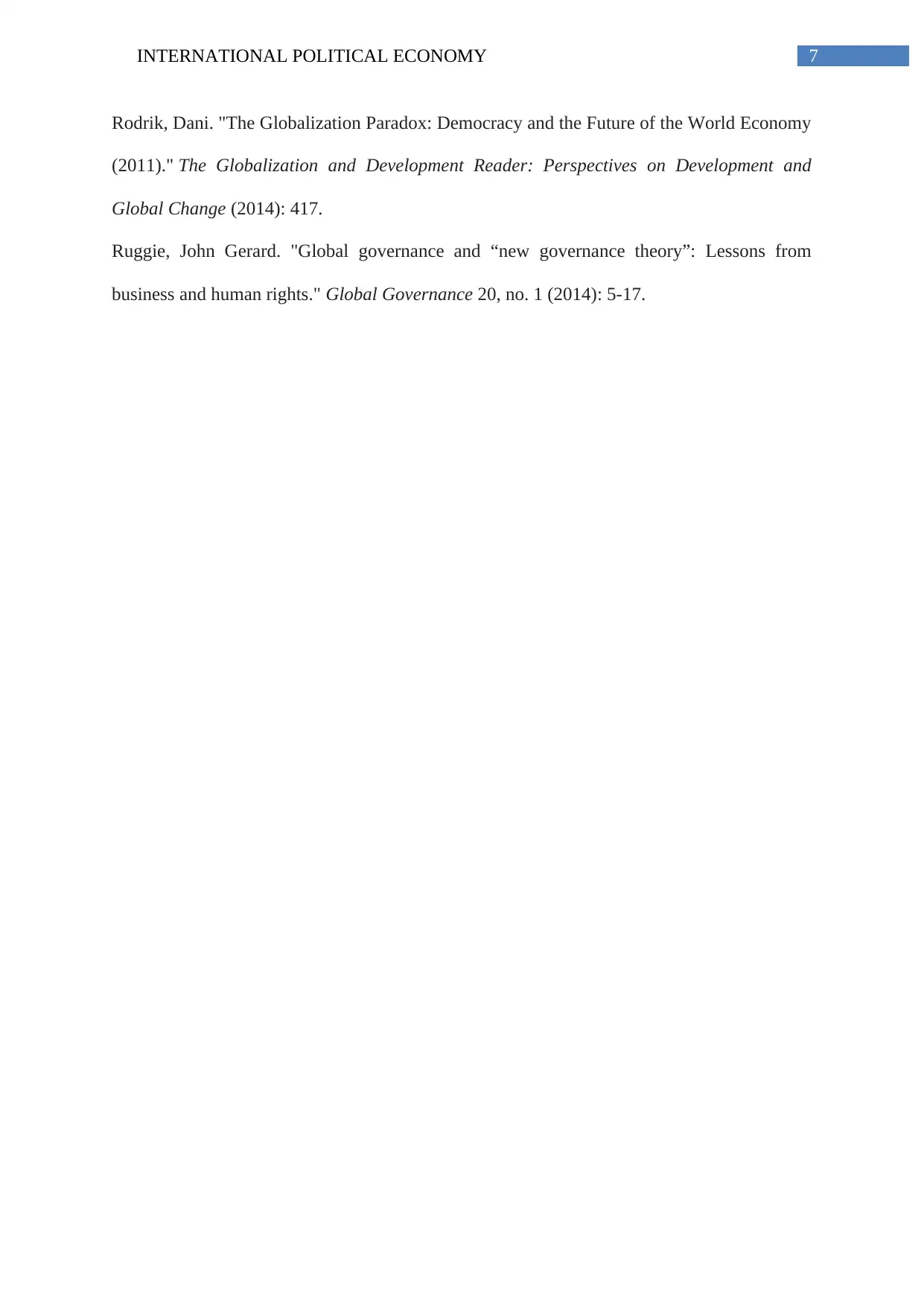
7INTERNATIONAL POLITICAL ECONOMY
Rodrik, Dani. "The Globalization Paradox: Democracy and the Future of the World Economy
(2011)." The Globalization and Development Reader: Perspectives on Development and
Global Change (2014): 417.
Ruggie, John Gerard. "Global governance and “new governance theory”: Lessons from
business and human rights." Global Governance 20, no. 1 (2014): 5-17.
Rodrik, Dani. "The Globalization Paradox: Democracy and the Future of the World Economy
(2011)." The Globalization and Development Reader: Perspectives on Development and
Global Change (2014): 417.
Ruggie, John Gerard. "Global governance and “new governance theory”: Lessons from
business and human rights." Global Governance 20, no. 1 (2014): 5-17.
1 out of 8
Related Documents
Your All-in-One AI-Powered Toolkit for Academic Success.
+13062052269
info@desklib.com
Available 24*7 on WhatsApp / Email
![[object Object]](/_next/static/media/star-bottom.7253800d.svg)
Unlock your academic potential
Copyright © 2020–2026 A2Z Services. All Rights Reserved. Developed and managed by ZUCOL.





